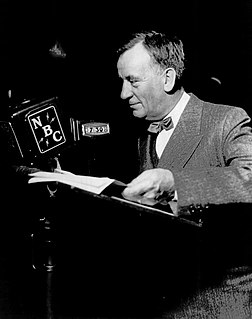A Quote by Ralph Waldo Emerson
Nature always wears the colors of the spirit. To a man laboring under calamity the heat of his own fire hath sadness in it. Then there is a kind of contempt of the landscape felt by him who has just lost by death a dear friend. The sky is less grand as it shuts down over less worth in the population.
Related Quotes
One cool judgment is worth a thousand hasty councils. The thing to do is to supply light and not heat. Ay any rate, if it is heat it ought to be white heat and not sputter, because sputtering heat is apt to spread the fire. There ought, if there is any heat at all, to be that warmth of the heart which makes every man thrust aside his own personal feeling, his own personal interest, and take thought of the welfare and benefit of others.
Out of the silver heat mirage he ran. The sky burned, and under him the paving was a black mirror reflecting sun-fire. Sweat sprayed his skin with each foot strike so that he ran in a hot mist of his own creation. With each slap on the softened asphalt, his soles absorbed heat that rose through his arches and ankles and the stems of his shins. It was a carnival of pain, but he loved each stride because running distilled him to his essence and the heat hastened this distillation.
You might find it difficult to see anything but your own sadness, the way smoke can cover a landscape so that all anyone can see is black. You may find that if someone pours water all over you, you are damp and distracted, but not cured of your sadness, the way a fire department can douse a fire but never recover what has been burnt down.
Yossarian was cold, too, and shivering uncontrollably. He felt goose pimples clacking all over him as he gazed down despondently at the grim secret Snowden had spilled all over the messy floor. It was easy to read the message in his entrails. Man was matter, that was Snowden's secret. Drop him out a window and he'll fall. Set fire to him and he'll burn. Bury him and he'll rot, like other kinds of garbage. The spirit gone, man is garbage. That was Snowden's secret. Ripeness was all. I'm cold,' Snowden said. 'I'm cold.
To no man does the earth mean so much as to the soldier. When he presses himself down upon her long and powerfully, when he buries his face and his limbs deep in her from the fear of death by shell-fire, then she is his only friend, his brother, his mother; he stifles his terror and his cries in her silence and her security; she shelters him and releases him for ten seconds to live, to run, ten seconds of life; receives him again and again and often forever.
It is a common error, and the greater and more mischievous for being so common, to believe that repentance best becomes and most concerns dying men. Indeed, what is necessary every hour of our life is necessary in the hour of death too, and as long as one lives he will have need of repentance, and therefore it is necessary in the hour of death too; but he who hath constantly exercised himself in it in his health and vigor, will do it with less pain in his sickness and weakness; and he who hath practiced it all his life, will do it with more ease and less perplexity in the hour of his death.
At Christmas A man is at his finest towards the finish of the year; He is almost what he should be when the Christmas season's here; Then he's thinking more of others than he's thought the months before, And the laughter of his children is a joy worth toiling for. He is less a selfish creature than at any other time; When the Christmas spirit rules him he comes close to the sublime.
His face set in grim determination, Richard slogged ahead, his fingers reaching up to touch the tooth under his shirt. Loneliness, deeper than he had never known, sagged his shoulders. All his friends were lost to him. He knew now that his life was not his own. It belonged to his duty, to his task. He was the Seeker. Nothing more. Nothing less. Not his own man, but a pawn to be used by others. A tool, same as his sword, to help others, that they might have the life he had only glimpsed for a twinkling. He was no different from the dark things in the boundary. A bringer of death.
A man's house burns down. The smoking wreckage represents only a ruined home that was dear through years of use and pleasant associations. By and by, as the days and weeks go on, first he misses this, then that, then the other thing. And when he casts about for it he finds that it was in that house. Always it is an essential - here was but one of its kind. It cannot be replaced. It was in that house. It is irrevocably lost...It will be years before the tale of lost essentials is complete, and not till then can he truly know the magnitude of his disaster.





































